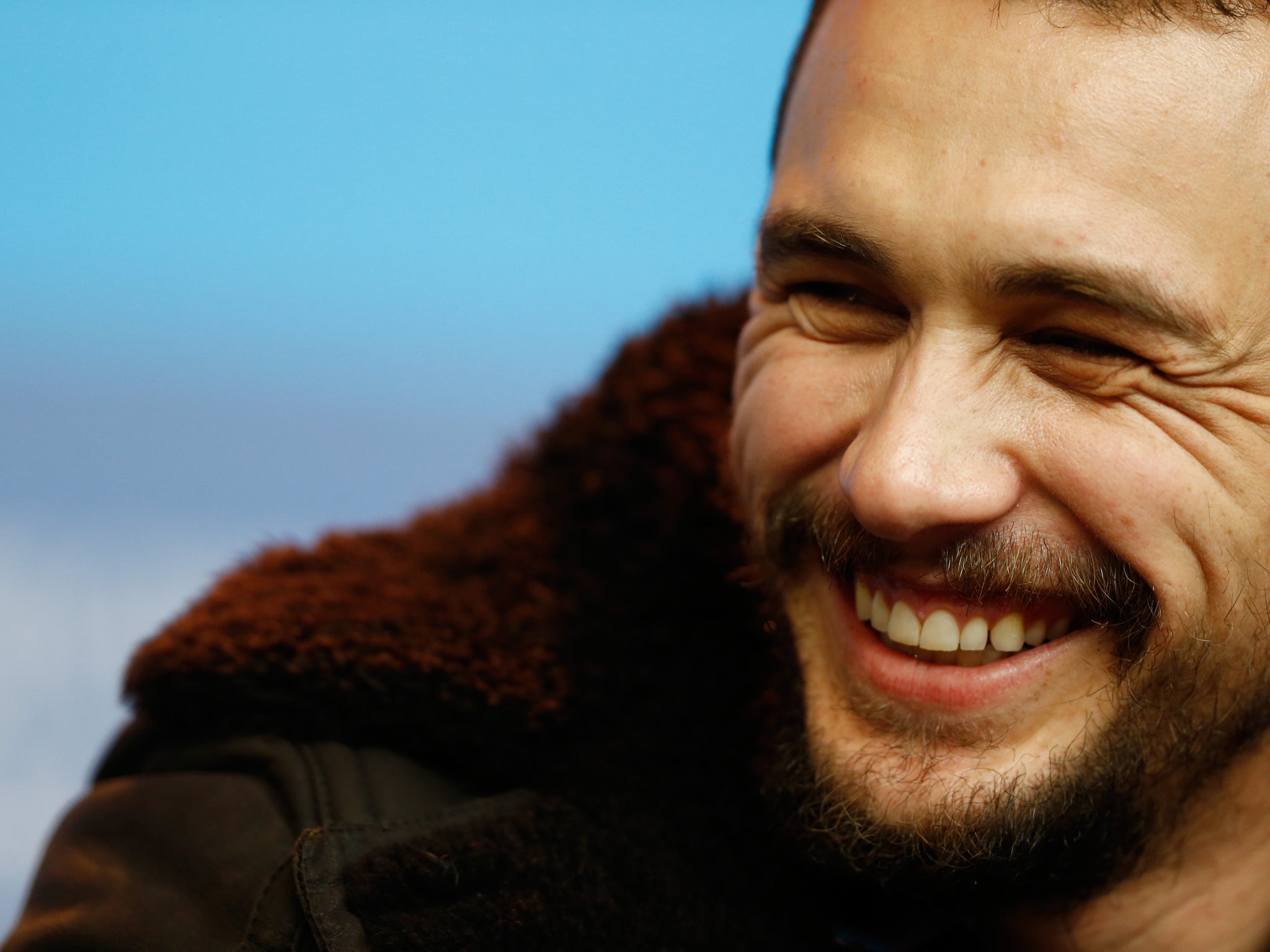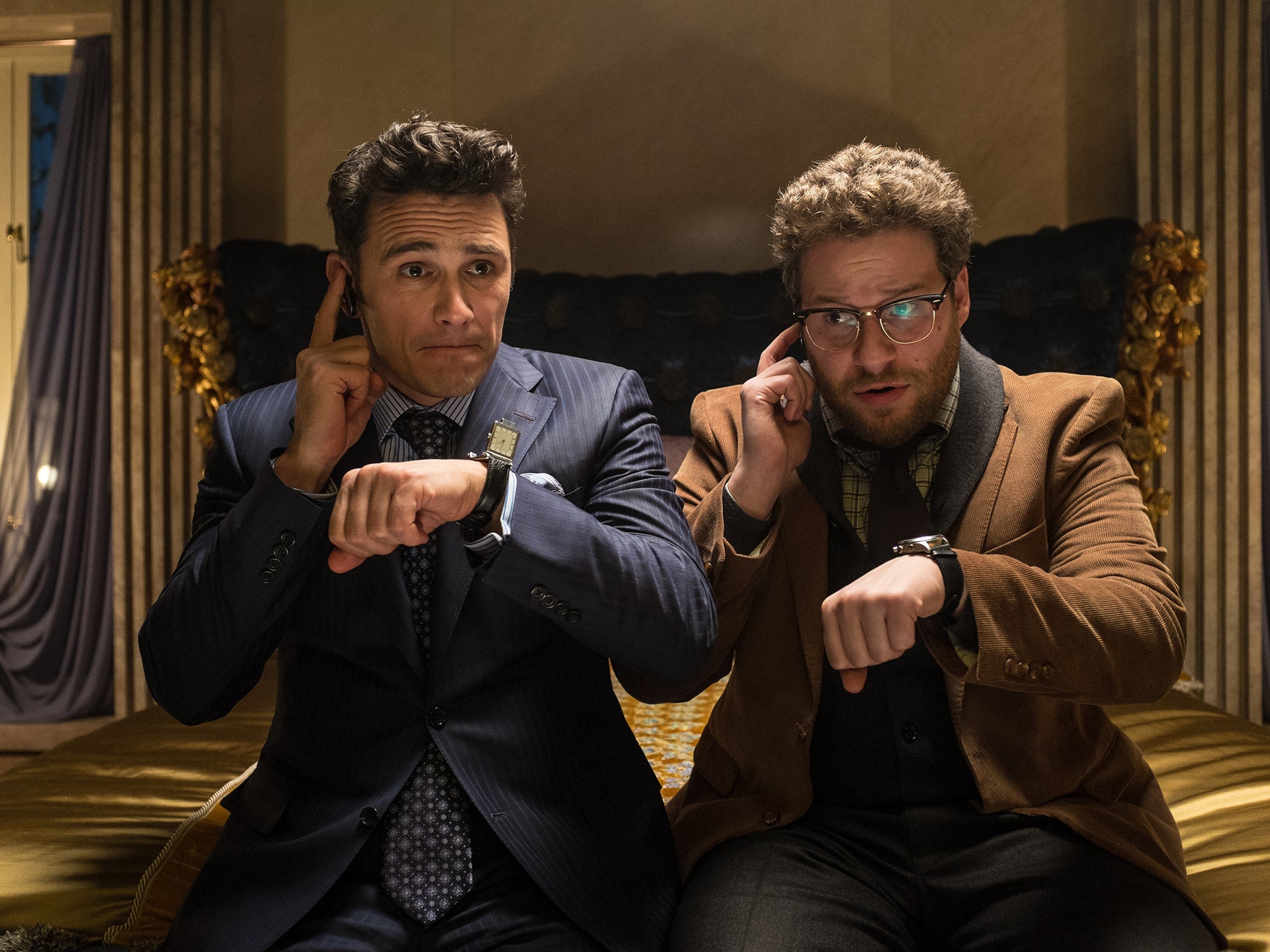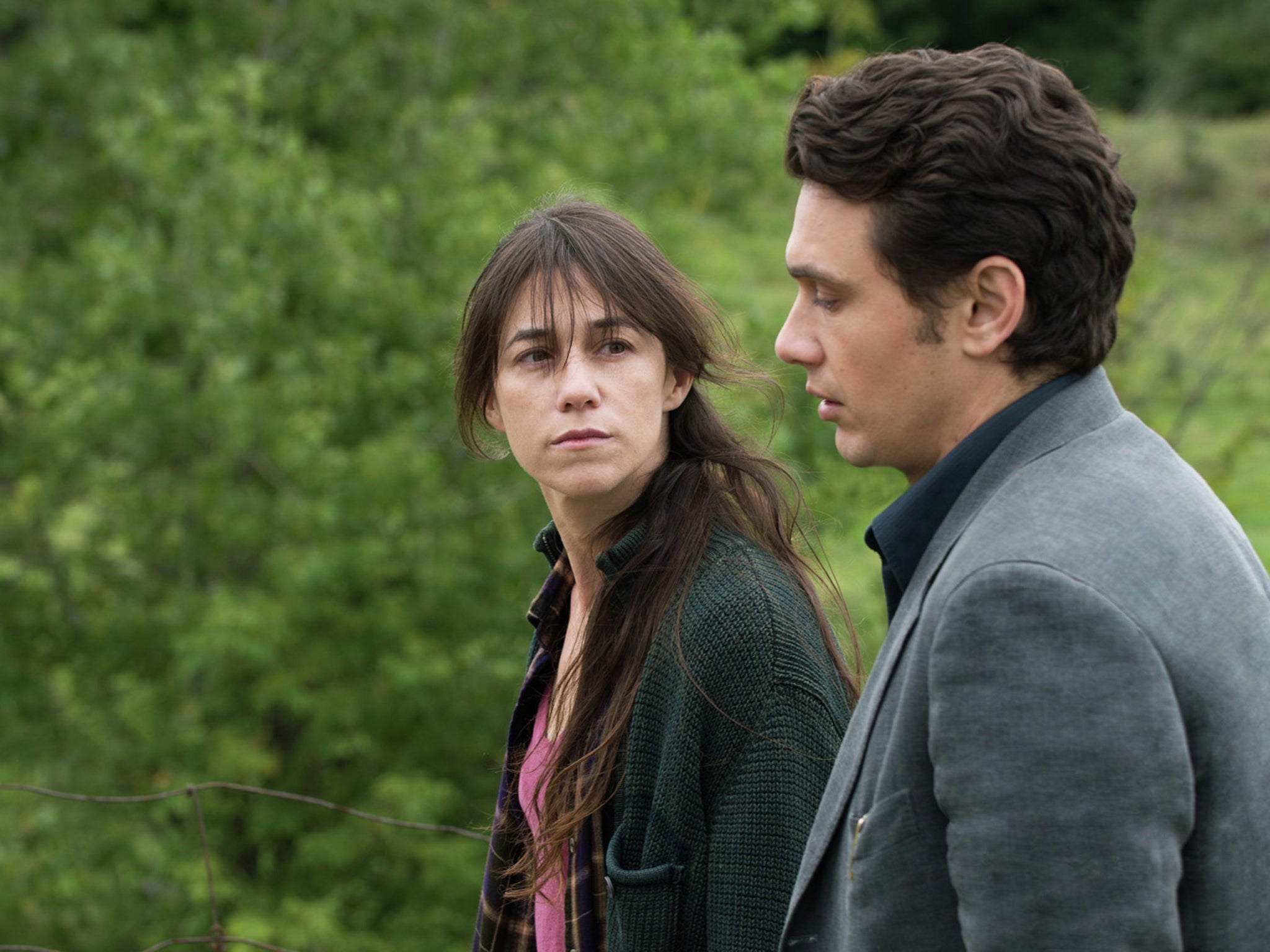James Franco talks Sony email hack, Hollywood homophobia and Everything Will Be Fine
He acts, writes, directs, sculpts, lectures – and he takes flak for most of it - It’s all part of being James Franco

It is hard now to conceive of the opening of a major film festival without James Franco appearing in at least one film. He is arguably the hardest- working actor in showbusiness. And when the Toronto Film Festival opens next week, the actor will be hoping that the talk will be centred once again on his Renaissance-man qualities and not the scandal that rocked Hollywood last year.
The actor/director/producer/scriptwriter/university lecturer was – as a producer and star of The Interview – at the centre of the biggest Tinseltown story in years, one that eventually brought down the co-chairman of Sony, Amy Pascal, in February.
When the trailer for The Interview, about a plot to assassinate Kim Jong-un was released, North Korea issued a statement that releasing the film would be a “war action”. Sony refused to pull the film, although the chief executive of Sony in Tokyo, Kazuo Hirai, argued for some cuts to be made. Then in November last year an organisation calling themselves Guardians of Peace hacked into the Sony computer systems and publicised the private emails and salary information of the staff. A month later the hackers sent an email demanding that The Interview never see the light of day. Cinema chains then refused to show the film after the hackers threatened a terrorist attack.

In all of the destruction there was a silver lining for Franco. When the film was eventually released on video-on-demand platforms it made $40m, making it by far the most successful film ever released online. Franco and his regular cohort Seth Rogen benefited from an American public who wanted to show that they refused to put up with tyranny, cyber or otherwise, from a foreign state.
Yet what could have been the last laugh for Franco, was somewhat tainted by Pascal failing to save her job at Sony. “I think it’s a shame,” says Franco of the firing. “I mean everybody was surprised and hopefully, when something like this happens again, we’ll learn from it. In the end it was a real shame that Amy Pascal had to step down because she was an incredible studio head, and I don’t think she should take the blame for, you know, what happened.” He doesn’t think he should take the blame, either. As he told David Letterman, “we never felt like we were responsible or doing something wrong”. He also believes that the film would have been a blockbuster hit had it been released in cinemas as planned.
Since February, when three films debuted at the Berlin Film Festival, Franco has been keeping a relatively low profile. Audiences might be forgiven for breathing a sigh of relief; over the years, Franco has been everywhere, even hosting the Oscars alongside Anne Hathaway.
His ubiquity – and that less-than-stellar hosting gig – have made him a love-him-or-hate-him kind of guy. He has danced between huge blockbusters (Planet of the Apes and Spider-Man), comedies (Pineapple Express and This is the End), and critical hits (Milk and 127 Hours). And whereas a lot of actors would rest in between times, possibly spending their money, Franco has been making art. As a director he seems to revel in impossible adaptations. His two versions of William Faulkner classics – As I Lay Dying and The Sound and the Fury – infuriated most critics.
At 37, he is a chameleon; a successful acting career is no longer enough to satisfy him. Perhaps it never was. “I’ve had moments where I was searching for alternative ways of living, for me it was mostly professional. I was unhappy with how I was conducting myself in the professional film world and I was making myself very unhappy,” he says. “So I had to find new ways of working. It wasn’t really a crisis of faith or anything like that... But I did have a similar thing, when I was 27 and I went back to school.”
He enrolled at UCLA for an English major in 2006. When he moved to New York in 2010 he signed up to courses at four different schools and is currently a PhD student in English at Yale.

Watch Apple TV+ free for 7 day
New subscribers only. £9.99/mo. after free trial. Plan auto-renews until cancelled.
ADVERTISEMENT. If you sign up to this service we will earn commission. This revenue helps to fund journalism across The Independent.

Watch Apple TV+ free for 7 day
New subscribers only. £9.99/mo. after free trial. Plan auto-renews until cancelled.
ADVERTISEMENT. If you sign up to this service we will earn commission. This revenue helps to fund journalism across The Independent.
“People like to split it up and make me seem like I’m schizophrenic or something,” he shrugs. “I see everything as connected and the guiding force behind all of it is my interest in all these different things and my pursuit of new forms of creativity. So the producing, writing or directing are just alternative outlets.”
Oh, he also writes books. His short story collection Palo Alto, about the California town he grew up in, was turned into a film. He followed it up with James Franco: Dangerous Book Four Boys which detailed an exhibition that contained video works, multimedia installations and sculptures by Franco. In 2013 he wrote a novel, Actors Anonymous. “One of the things that I tell people is, ‘go and do it’. Don’t wait for the gatekeepers to say, ‘okay’. Don’t wait around, because we can now take advantage of the technology.”

Some might see this answer as pretentious, but in person the side of Franco that shines brightest is his academic side. He dresses like a hipster but brown corduroys would be more fitting as he gives considered, erudite, answers to questions.
Working on his own projects gives him a sense of creativity that he doesn’t get from acting. When I met him for the first time some years ago, he told me: “As an actor I feel like it’s my job to serve the director. I’ve accepted that. In some ways it feels like a craft rather than an art form. Sure I had some freedom of interpretation, but I feel like I’m serving someone else’s vision. With my writing, or with the art pieces, I’m the initial creator, so there is more freedom.”
He is well aware of the criticism he attracts and could easily shy away from it, but it is all part of his best creation, his most important role – being James Franco. He has played himself enough times, after all. In his collaboration with the artist Carter, Erased James Franco (2008), he re-enacted every performance from his career. This resulted in Franco persuading the soap General Hospital to give him the role of Franco, an artist and serial killer, which was then dissected in his 2012 film Maladies.
He also re-purposed the General Hospital footage for his metaphysical film Francophrenia (Or Don’t Kill Me, I Know Where the Baby Is). And, in the comedy This is the End, he played himself, as the host of a party that takes place on the night of the apocalypse.

The need to put himself in his own work comes from his struggle to separate his personal life from work. “My work is one thing and my identity is something else, but when acting was all I had, my identity was inevitably tied to my career. So if my career was not doing well, I inevitably felt bad.”
He admits that he struggles to switch off. In between takes, he likes to read books. Seth Rogen would make fun of him for reading on the set of Freaks and Geeks. On the set of his new film, Every Thing Will Be Fine, meanwhile he was preparing for his oral exams in literature.
In Wim Wenders’ new film, he plays a writer who is driving in the snow and kills a child. The accident leads to depression and writer’s block until, a decade later, he begins writing a book about the experience.
Franco also stars in Werner Herzog’s Queen of the Desert, in which Nicole Kidman plays British archeologist Gertrude Bell and Franco plays her lover, Henry Cadogan, a secretary at the embassy in Tehran.

Herzog is known for his arduous shoots, making his actors go through all sorts to get the shot he wants. How was it? “In a way we got off easy”, says Franco a little sadly. “We didn’t have to eat any bugs, or pull a boat over a mountain.”
He has also produced I Am Michael, in which he takes the lead role of Michael Glatze, a gay activist who rose to fame in 2007 after he quit his job editing a gay lifestyle magazine and began denouncing homosexuality.
Franco has often played homosexual characters on screen: he played Allen Ginsberg in Howl and gay politician Harvey Milk’s love interest in Milk, as well as directing himself in The Broken Tower, about American poet Hart Crane. In Interior. Leather Bar, he reimagines the 40 minutes of bondage footage that William Friedkin had to cut to ensure that his Cruising avoided an “X” rating.
The numerous gay roles have inevitably led to some questioning Franco’s sexuality, though he has always dated women, including the actress Marla Sokoloff and then Ahna O’Reilly. In 2014 while performing on Broadway, he notoriously used social media to try to set up a rendezvous with a 17-year-old fan.

The single actor has even addressed the rumours himself in a written interview in which he imagines ‘Straight James Franco’ interviewing ‘Gay James Franco.’ And when he agreed to be roasted on Comedy Central, there were a number of gay slurs made against him and some of his comedies that seemed homophobic.
“It’s weird,” he says about the tactless gay humour. “I was a little shocked, I didn’t write those jokes [at the roast], they did. I didn’t make any gay jokes. There is still a little bit of homophobia. I think part of it, when I do films with Seth, it’s more playing on straight male anxiety about any sort of same-sex interaction. To me that is really a comment on a larger anxiety and not really anything about denigrating or criticising anything about the gay community.”
One of the many upcoming projects with which Franco is associated is a documentary, now in post-production, about him by his former student Lisa Vangellow, who has been following the actor around for a year and a half.
“There were times I regretted saying yes,” admits Franco. “But only because it’s annoying having someone follow you. And then, automatically everyone thinks it was my idea, that I’m this vain guy that wants a camera following me around all the time.”
‘Every Thing Will Be Fine’ premieres at Toronto Film Festival and will be released next year
Join our commenting forum
Join thought-provoking conversations, follow other Independent readers and see their replies
Comments
Bookmark popover
Removed from bookmarks